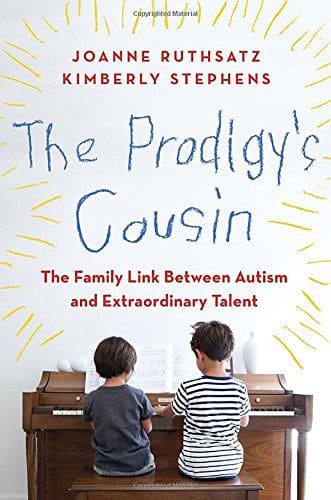“The Prodigy’s Cousin”
Joanne Ruthsatz and Kimberly Stephens
Three interesting narrative lines propel “The Prodigy’s Cousin: The Family Link Between Autism and Extraordinary Talent,” a new book by psychologist Joanne Ruthsatz and her daughter, science writer Kimberly Stephens. First there is the endlessly fascinating connection between high intelligence and behavior on the autism spectrum – something we’ve glibly mythologized in such stereotypes as the absent-minded professor and the geeky tech guy. Second is Ruthsatz’s intensive, long-term investigation of child prodigies – defined as children who reach professional capability in a demanding field by the age of 10.
Third is her observation that roughly half of these prodigies, although they are not autistic, have relatives on the autism spectrum, which raises the question of whether further study of the genetic connections might lead to a breakthrough in the treatment of autism.
The book is enlivened by closely observed, anecdotal stories of the children – both prodigies and kids with autism.
She begins with an account of two brothers, both of whom were diagnosed as autistic: the silent, withdrawn Alex, who didn’t speak his first word until he was 2 1/2, and William, who at that age was actually spelling words (he wrote “algorithm'” with magnetized letters while sitting in his high chair) but who didn’t interact with other children and could barely dress himself even when he started school.
Amid the prodigies playing violins or painting or solving complicated equations in their heads or doing other prodigy-type things, Ruthsatz introduces us to Greg Grossman, the “tiniest chef.” At 4, he was making dinner (well, a stuffed baked potato) for his parents. At 9, he was dishing up melon carpaccio with anchovies, pan-seared scallops and a wild mushroom medley. By 12, he was cooking at a restaurant and, at 13, he cooked on the “Today” show.
There’s also the Tiessen brothers – Josh, recognized as a talented artist from toddlerhood, and his younger brother Zac, who seemed to be a normal if slightly overactive kid who, at the age of 13, fell, hit his head, lost consciousness and woke up a musical genius. And more – about a dozen unusual kids in all.
Ruthsatz follows her subjects for several years. In an epilogue, she describes how Greg is a chef and restaurateur. Teenagers Josh and Zac are “both blooming professionally” – Josh selling his work for five-figure prices, and Zac releasing his first solo CD at 17.
Alex, amazingly “grew out” of his autism and, now in fifth grade, shows no signs of it; in fact, he’s a strong athlete, a cheerfully excellent student and a good communicator. William is brilliant at many things – music, math, computer code – but still sometimes finds it hard to interact with other people.
“Both kids are very bright, but my priority is that they’re happy,” their mother says. “That’s what I want in life for them; that’s successful.”






